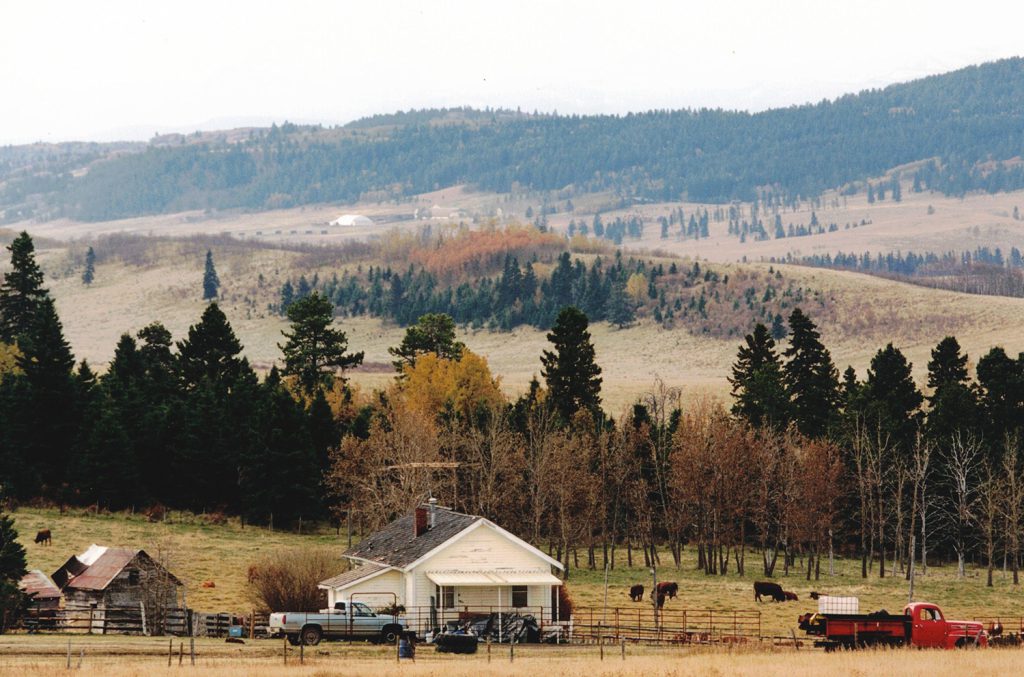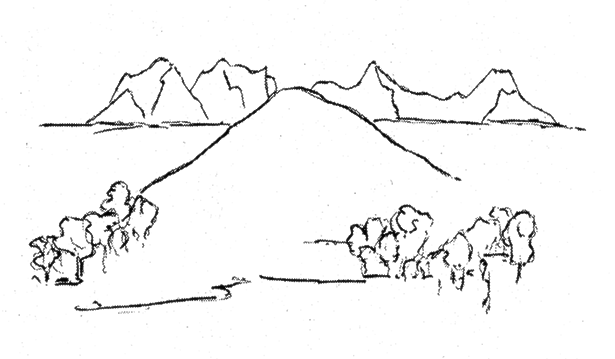
“WELL. I GUESS.”
Dad rose from the breakfast table.
There was no point waiting for him to finish; it was just a signal to himself,as much as anybody I suppose, that work was about to begin. He whistled an old Wilf Carter tune as he pulled on his boots in the back porch. I tipped the old kitchen chair back down on all fours and made to follow his lead.
“Good luck in the hills,” she replied.
“Yep. Well, we’ll see you later, Mom.”
“I don’t imagine we’ll be back in time for lunch, that’s for sure,” I said,cranky at having to tackle this job at all today.
As far as I was concerned, we were really putting ourselves to the test,trying to drive a hundred or so head of yearling cattle up to the top of one of the highest of the Wildcat Hills. Its bald knob rose west of our little
farm — not only was it farther away than it appeared, but it was also a heck of a lot steeper than it looked, too. And if I knew one thing about chasing cattle, it was that the path of least resistance was always for them. Once we had them close to the bottom of the hill, tired as they’d be and with that good grass down on the flats in their sniffers, it would take a small miracle to push them up top.
Although I had a lot of faith in my dad’s judgment, I was wondering if we shouldn’t have tried to get a few more riders out to help.
“No, we’d better not bother. We might end up in a real jackpot,” he’d said when I had broached the subject a few nights earlier. “What if somebody gets lost or all tangled in the bush? Not everybody understands cows, y’know.”
Well, both Mom and I knew if there was one thing Dad could understand it was those old cows. Who else but him would comment, “Boy, that would sure be a tasty mouthful for a cow, wouldn’t it?” after inspecting some exotic legumes in my aunt’s backyard in town?
The front lawn, that morning, had been touched by a bit of frost—not too much, but that nip in the air helped me to come to life. In those days, I wasn’t a coffee drinker in the mornings. The work for the day tended to come upon me in a hurry, and once I got moving around in the fresh air, I became about as awake as I was going to get.
That particular morning was shaping up to be nice and sunny, but we had other problems. Neither Dad nor I had remembered to shut our saddle horses up in the corral the night before. Valuable time (not to mention patience) slipped away as we tried to get our two mares, Jenny and Dixie, out of the willows and up to the barnyard.
“Hi! Hi! Hi!” I yelled as I slipped and tripped in the bog, getting my boots wet in pursuit of the two. I looked over and saw Dad shaking a rusty old pail full of oats at Dixie.
“Whoa, girl… That’s it… That’s it…Eeeaassy.”
He was a real horse expert and damned if he didn’t manage to get the bridle around her neck. That old horse never even saw it coming. The two horses always stuck together, so Jenny followed Dixie up to the corral, and
I caught her easily then.
Before long the sun was hot, and we had about one hundred head of yearling cattle strung out in front of us. Dad wasn’t whistling anymore.
“Crowd ’em up,” he’d shout at me once in a while. That ticked me off because I thought I knew pretty good how to move cattle, and I thought I was keeping things going about right. Sometimes there was just no pleasing Dad.
Whenever I tried my best and succeeded at something I was excited about, like getting a hat trick in hockey or making a new friend at school, he would give me a patronizing “Oh, yeah, good. Yep, really good!” I didn’t feel all that special after getting his reaction. I imagine he
thought I was in a hurry to grow up, and until I could perform what he recognized as worthwhile in his world,
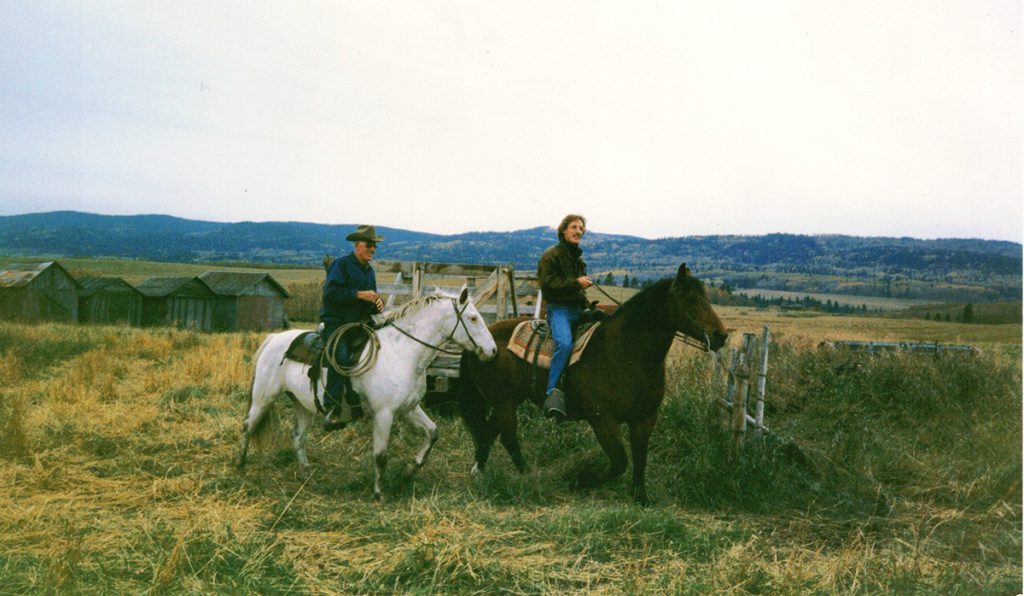
he felt some responsibility not to give me any false encouragement. He probably figured it wise not to takeany grown-up posturing of mine too seriously.
We were on a government grazing lease my dad had secured back in the fifties. Dad was granted custody of two sections of country that was too rocky to farm; yet it provided decent pasture along the creek bed andthe odd flat where clover, timothy, and other native grasses grew. It had been logged off ten years earlier, and all the new growth was coming up thick as hair on a dog, which made it pretty hard travelling once we headedoff the beaten trail.
“Hi! Hi! Hi!” My gawd! Those yearlings had no clue what direction to travel. Through heavy poplar growth, they went crashing down toward the creek, and I could barely keep up. I rode along through the young trees until I figured old Jenny and I had been stung enough by those branches.
Then I tied the lines up to the saddle horn, jumped off, and hoped Jenny would either follow along or graze while I lit out afoot to monitor the progress of the herd.
“Ho! Ho! Yaaah!” We reached the beaver dam. Now it was critical to stay to the west of them—if even a few head got on the trail going west toward the creek bottom, we’d lose them all. It was definitely the path of least resistance, and thinking like a cow, or just like my dad, I knew they could be awfully stubborn when they got it in their heads to go somewhere.
I knew I’d better not slip too far behind.The whole event reminds me of that old proverb: “You should never confuse movement with action.” Like a sailboat tacking into a headwind,we zigged and zagged across the face of the slope. The cattle trail I’d cutout last summer obviously didn’t appeal to their bovine instincts. Mytrail-blazing idea had come from getting the buggers within a hundredyards of the gate last year—just to see them get confused and run backdown the hill. We then had to give up and we spent every morning of the next week riding around getting a few at a time up that big hill and intothe destination pasture, which we referred to by its legal land description:Section 29.
“Let ’em go! Let ’em go!” Dad was bellowing. I stopped my yelling andstick-swinging performance long enough to realize he was shouting at me and not the yearlings. I could hear him, but I couldn’t see him, and he couldn’t see me.
“All right! All right!” I shouted back toward his voice. But something inside me didn’t want to give up just yet. I was not the kind of kid who was belligerent, but I wasn’t going to be back here tomorrow riding around trying to find these bunch-quitters if I could help it. Damn! I wanted to pull this off.
Berserk is a word of Norwegian origin. I learned this from a Swedish farmer who told me that the Vikings ate a certain variety of mushroom before going into battle. Ihe spectacular bravery and savage attacks were apparently due to some chemical in the mushroom. Well, I momentarily became a Viking. I lunged into the bush, creating as big a commotion as I could, whistling, screaming, yelling, and pounding the backs of those poor cattle the likes of which they’d never experienced. They responded by bucking up in the air to pull themselves through the tangled brush and deadfall in that thickest part of the bush. Then with one final bellow, I sent them scattering in every direction.
“What the heck am I doing? Calm down,” I told myself. Completely hoarse, I scrambled back behind the heavy brush to push what was left of the main bunch uphill.
Along the creek bed was a beautiful flowering weed called larkspur.
About that time of year, before it flowered, it contained enough methyllcaconitine—which acted like strychnine—to entirely shut down the nervous system of any large mammal, cows included. Dad had become familiar with this killer weed the hard way, finding a dozen dead steers in the willows one July. Like they say, cows are always finding new ways to die—if they weren’t catching the latest virus, they were drowning in water holes, or even being electrocuted by barbed wire fences during lightriing storms.
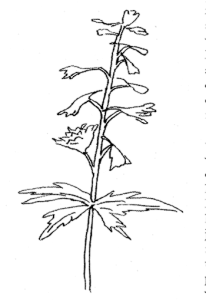
Because of that larkspur threat, it was life or death that those young cattle of ours made it up that hill into safe grazing territory on Section 29
Like all the other ranchers we knew, we were just trying to do what was best for the animals. In spite of what those less familiar with the profession (or, for that matter, the cattle themselves) might think, the mission at hand was in all our best interests. If only they could see that lush clover on top of the hill!
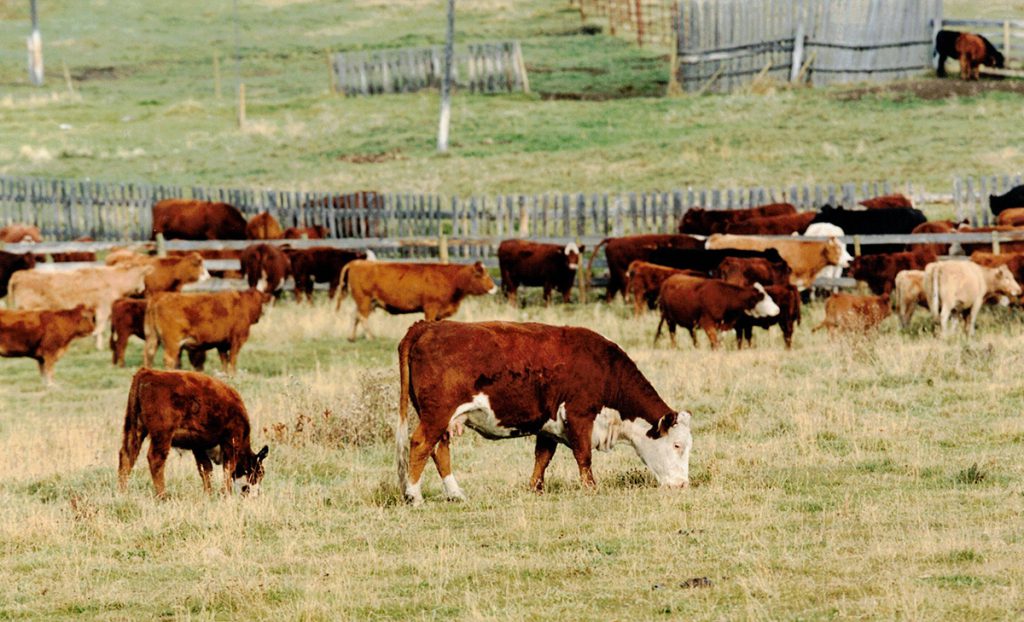
When you’re holding a hammer, everything can start to look like a nail. In this case, instead of a hammer, I held a nice long willow stick. Whack!
Whoosh! I became an expert over the next hour or two at stinging the stragglers of the bunch with my new persuader. My voice played out and only a good crack on the backside could get these tired critters to move along—and at this point, we were all into our second (or even third!) wind.
Slowly but surely, the cattle and I made our way up that big hill.
When I spotted Dad again, he was making for the lead to open the gate into Section 29. This could be it! I hoped they wouldn’t make one last attempt to turn back on me, like last year. At that stage, I didn’t have the energy to battle their retreat.
Once they caught a glimpse of some nice long grass on the other side of that open gate, we seemed to have them beat. With a sudden burst of energy, they ran through the gate into the pasture, reaching down to grab mouthfuls of grass as they went.
“Well, I guess we’re about thirty short; Dad said as he pencilled a number into the gatepost. I could tell by the tone of his voice that he thought we’d done a pretty good job.
I was just about to reply that getting over half the herd in there wasn’t too bad for a day’s work, when I saw, just on the other side of the east fence, looking confused and anxious, those thirty missing head!
I made a beeline for the fencing pliers Dad always kept tied to his saddle. Dixie was still puffing. I tugged at the leather knots holding the pliers, glancihg nervously over my shoulder until I finally got them. I walked, slow and deliberate, toward the east fence.
In a few minutes, I had the wire down, and Dad jumped aboard Dixie to coax them through the gate with the others. It was clear they had heard, and now seen, the fate of the main gang munching on the rich clover of Section 29, and they wanted to be with them in the worst way.
“Well, for gosh sakes! I guess we got lucky today,” Dad said with a satisfied grin. He got down off Dixie. “It’s a mystery why thefd climb that hill all on their own. They couldn’t have gone through that jungle where we left them, could they?” he asked.
I wondered ifhe had heard me raging like a wild man after he told me to give up on them a few hours earlier. Dad continued. “I had visions of us riding for the next three or four days before wed get them all captured.”
“Yeah, I guess you’re pretty disappointed at that, eh?” I joshed him.
We both lay back on the grass and had a chuckle at our good fortune.
“They II be all right now;” Dad said happily. “We’ll just have to come up and put out salt in the next day or two.”
I suppose if we were real, old-time cowboys, wed have pulled out the makin’s and rolled a couple of smokes, but instead we rested a while, enjoying the rewards of a job well done.
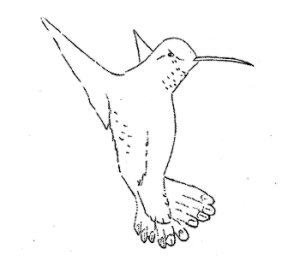
A hummingbird appeared for a few seconds and hovered between us as it checked the buttercups and shooting stars. “Isn’t that something!” I Said, as it flicked, whirling this way and that before it was sucked back up into the big blue sky.
I felt the sun warm against my face, and something inside told me that this was a special moment. We were both proud of what wed been able to do. Neither of us would ever say it, but to me that really didn’t matter.
Some dramatic show of affection is supposed to demonstrate the breaking down of barriers between father and son. Back out there on the pine and poplar slope, I was probably going to get more affection from my sweaty old horse Jenny, when I finally located her on the trail, than I would from my dad. He knew, and I learned, that a real father-son bond is built through shared experience.
I knew I’d never be an equal to Dad when it came to ranching, but that didn’t mean he couldn’t make me feel good about accomplishing something on his terms. Using the hard work ethic hed taught me, I later proved myself through accomplishments at school, at sports, and at making music. Looking back on that special day, I realize both Dad and I got to feel like wed proved a point. We took our time as we made for home—Dad in the lead.
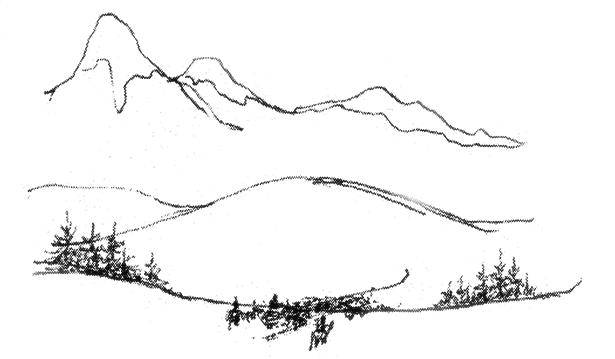
The End
